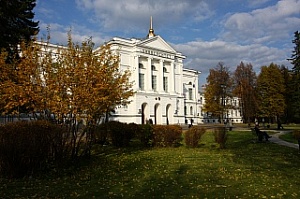Since the beginning of this academic year Master's programme Human Development: Genetics, Neuroscience and Psychology began working at the International Centre for Research in Human Development (ICRHD). For the first time at TSU, a Master's programme is implemented entirely in English, teachers are both Russian and international scientists.
The Master’s programme in English appeared on the base in the centre due to the large number of international projects that TSU implements jointly with international partners. The purpose of this Master’s programme is to prepare effective specialists in cognitive technology and neurotechnology, scientific communication, and also design and evaluation of development programmes.
The Master’s programme of the international center is interdisciplinary, and it has graduates of different specialties: psychology, linguistics, mathematics, biology, computer science, and others. The emphasis during the training is made on practical work of students.
- Just from the second week we begin to involve Master’s students in the leading scientific projects, which are implemented on the basis of our center - says Professor Yulia Kovas, the director of programme. - We believe that for two years the students will be able, firstly, to contribute to the studies that are already underway, and secondly, they have the opportunity to develop their own projects in the framework of international.
In particular, Master’s students participate in a longitudinal study of children's development, the projects of the Russian School Twin Registry (RSTR), and in the study of the phenomenon of bullying in schools.
The training programme is structured in such way that students can effectively participate in the research. At the beginning and end of the semester, there are intensive sessions: full-time classes are held five days a week on the base of the centre. Since the end of September, lectures and seminars will be held once a week, their visit will be possible both full-time and remotely. The rest of the time students will be able to conduct research.
- This is a very flexible model, but it has strict evaluation criteria. Students must achieve a lot. We introduced this model in order to they have the opportunity to conduct their research without compromises, - said Yulia Kovas.
About half of the teachers of the programme comprise leading international scientists from the UK, Canada, and other countries. It is planned that the students will be not only Russian but also international citizens. Already, the centre is regularly visited by international teachers and students and a few Russian Master’s and graduate students in a short time will go to London for six months (Goldsmiths, University of London).

